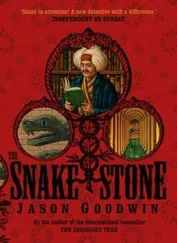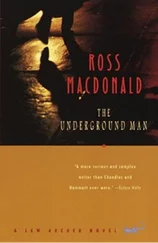And then I was aware of being a part of a rampant confusion of noise and thought that my exertions had brought me to the edge of madness and that I had begun to hallucinate, for amongst the apocalyptic din of the wind I thought I heard music.
I looked up and shading my brow, perceived that I was in the midst of a massive cloud of wind-driven garbage. The weird sounds were still audible but I could hear nothing of the men behind. I stopped and sank to my knees, finished.
Out of the darkest part of the storm, vague and shadowy forms materialised and took shape and I doubted my raw and streaming eyes, which now beheld the strangest, the most extraordinary of sights. A great giant of a man, taller by far than anyone I had seen before, mounted upon a camel and at his side a tiny midget, upon an animal whose like I had not seen but which evidently recognised my kind, for it spat at me as it passed.
Chapter Four
I
I SHOULD BE at other work than this. In the lobby beyond my office door are probably a whole roomful of people, half of whom will be awaiting my pleasure only so they may press more money upon me. They would have me sponsor this or endorse that, or simply do nothing so that they may further their own schemes. I pray that my loyal secretary and guardian of my secrets, Miss Tummel, will protect me from such distractions a little while longer.
But even she can impede my progress. She has reminded me that there is a speech I am to prepare and must give to the greatest of our great land. Its acceptance will inevitably result in the filling of the coffers of my associates and of my own purse too. However, compared with the tonguey rhetoric which was once my stock-in-trade and which might have earned me fifty or a couple of hundred dollars, or a few months in jail, it will be a poor affair. You who have the priceless leisure to read books for your own diversion may take me for a robber at least but if I commit robberies now, they are done in your name.
While we talk of robberies, I have one for you now. Readers of popular fiction may consider this a paltry affair: the theft has already been committed and there has been no fancy-play with six-guns. I’m sorry for that – if you prefer something more racy, you must open a dime novel or a daily newspaper.
A discovery was made while I lay asleep in Elijah’s room. D’Orleans had closed up the ticket office pretty sharpish; no one knew why. Then a couple of rounders had galloped through town, hollering about Barnum’s caravan coming up the road from the east. Soon after, riders and folk in buggies and on foot were streaming out of town to meet him, no matter that a wild wind was all but blowing them back into town. The rest of the populace found shelter and waited for the zephyr to blow itself out. Sometime during this, D’Orleans and Wilkes took themselves and the money out of town, most likely on stolen horses.
And P.T. Barnum did come to Hayes, Missouri, though I doubt it’s well-documented. The whole procession of gaily-painted covered wagons, teams of thoroughbred horses, great swaying stages packed with men and women inside and on top; freaks of nature on horseback and astride camels, Indians in the boots of coaches, huge carts piled high with cages of outlandish animals and ropes and tackle, canvas and abundance of mysterious contrivance, came quickly upon us and as quickly passed right on through.
We watched them rush headlong past, drivers whipping on the beasts with cries of ‘Hi-yi!’ and ‘G’lang!’ through crowds who had turned out to see Barnum arrive and you can imagine the kind of feelings that were abroad when it was realised that not only had the townspeople been swindled of their money but P.T. Barnum wasn’t even going to stop in Hayes anyway. The Barnum circus, looking neither tuckered nor travel-stained, as the efficient machine had unloaded from hired freight cars just down the line, shoved for the next town, where they mounted a memorable show and those who could still afford to follow him and see it, said it was wondrous to behold.
I don’t know that Barnum already had intelligence of something amiss in our town but he sure seemed in an uncommon hurry to put some dirt between him and Hayes. At least, that was the verdict of the informal inquiry held in the lobby of the Particular Hotel, the next morning. A deputation of citizens had arrived, headed by Judge Eckert and Sheriff McCulloch.
‘Maybe we was swindled by Barnum,’ someone said. ‘And it was all like we thought. The smooth-talking feller was Barnum himself.’
‘Don’t be so foolish,’ said McCulloch, ‘Barnum ain’t the man to do nothing of that sort. Fact of the matter is, he never planned to stop in Hayes and was only makin’ for the next place. We was a passel o’ fools to get taken in like we did, but it wan’t Barnum’s fault.’
‘They must have been considerable smart fellers to get the drop on us,’ said Old Henry.
‘Smart?’ said a deputy. ‘I’ll say they were. Why, those two boys were probably the slickest, sharpest operators as ever palmed a silver dollar. Didn’t you hear they did the exact same as this in Syracuse? And they’re double-smart people, in Syracuse.’
Others nodded and murmured their agreement, consoled in part, that they had been some taken in by the best. As we had appeared closely connected with the swindlers, Merriweather and I were keenly questioned. I told my story a number of times, repeating and enlarging on details I had given before and was believed in the end, in a grudging sort of a way, but not before I had been accused, sniped at and generally made to feel like the biggest fool in a ship of the same. That I might have easily borne for I felt as much myself but what had unnerved me during the ordeal was the entrance of Mrs Bullock and her daughter, Cissy, who swept past me and took seats at the back of the crowd. When I had been interrogated, derided and sent about my work, the crowd listened to Merriweather as he protested his innocence and neatly attached any remaining blame and suspicion to my coat-tails.
I hung about the doorway, waiting for the crowd to disperse, that I might exchange a word with Cissy: her mother was a placid woman, generally amiable and not as decided in her opinions of me as was her husband. I had every hope of being able to wish her and Cissy a good day, a brief exchange which would have cheered me immensely and gone a long way towards compensating for the blight I had felt that morning.
They were last to leave the lobby and I followed them down the steps to their buggy. I walked over to the fly and opened the door and let down the step, intending to hand in first Dame Bullock and then Cissy herself. I longed for the soft touch of her hand in mine. But first I offered Mrs Bullock my hand and she astounded me by brushing it away with her parasol, snapping, ‘Unhand me, you ruffian,’ before boarding under her own steam. I looked to Cissy but she only glowered and avoided my gaze. When I asked what was up, she said, ‘You leave us be. Poppa was right. I was blind. You’re nothing but a low-down swamp-rat and I don’t want nothing to do with you, ever again!’
‘But, Cissy,’ I said, quite thunderstruck. ‘I just told the inquiry, I had nothing to do with the swindle. I’ll pay you back your money myself.’
‘I ain’t talking about the swindle,’ Cissy said. ‘I was referring to the shame your family brings to this town. I heard,’ she said, with a look of sour repugnance, ‘all about your mother, Billy.’
She cracked her whip and the buggy moved off, leaving me such a sorry individual that had I been a horse, or a dog, I would most likely have been shot.
II
Merriweather was looking for me but I couldn’t face his certain wrath. He had been made to look a bigger fool than he was and would be seeking to vent his ire upon me. In other circumstances, I might have gone to my mother but now that was out of the question: because of her, my Cissy had spurned me. I climbed the old tree I had spent whole days in as a kid and mused upon my relation, whom I occasionally glimpsed through a veil of yellow leaves as she took linen to and from the wash-house.
Читать дальше












